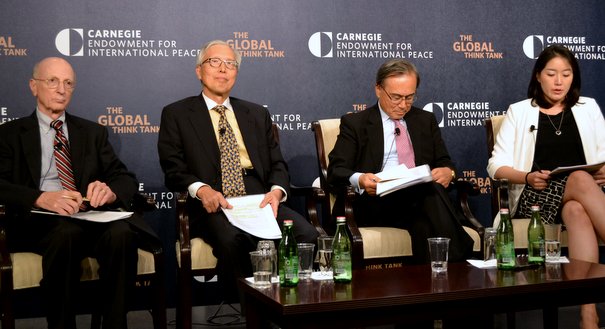Registration
You will receive an email confirming your registration.
This year marks the fiftieth anniversary of normalized relations between Japan and the Republic of Korea with the signing of the Treaty of Basic Relations. Over the past five decades, bilateral relations have far surpassed those of the previous sixteen centuries in terms of security cooperation, economic interdependence, and intellectual and cultural exchange, yet the scars of the past continue to challenge efforts toward more fundamental reconciliation and deeper collaboration.
This half-day conference combined a look back with a look ahead, exploring Japan-Korea relations from a security, foreign policy, and economic perspective and their connection to U.S. policy and strategic interests. What can success–and shortcomings–over the past fifty years of Japan-Korea relations tell us about how best to navigate the future for the mutual benefit of all three countries and for the region?
This conference was followed by a light reception.
Agenda
1:30–2:00 p.m.
Registration and Seating
2:00–2:15 p.m.
Introduction and Opening Remarks
2:15–3:45 p.m.
Session 1: The First Fifty Years of Japan-Republic of Korea Relations: Observations and Implications
- Kan Kimura, Kobe University
- Kim Tae-hyo, Sungkyunkwan University
- Victor Cha, Georgetown University
- James L. Schoff, Carnegie Endowment
4:00–5:30 p.m.
Session 2: The Next Fifty Years for Japan and Korea: Security, Foreign Policy and Economic Perspectives
- Amb. Shotaro Oshima, Institute for International Economic Studies
- Amb. Shin Kak-soo, Korea National Diplomatic Academy
- Alan Romberg, Stimson Center
- Duyeon Kim, Carnegie Endowment
5:30–7:00 p.m.
Post-Conference Networking Cocktail Reception
Shotaro Oshima
Shotaro Oshima is a former Japanese ambassador to the Republic of Korea (ROK) and a forty-year veteran of Japan’s foreign service. He is currently adjunct professor at Japan’s National Graduate Institute for Policy Studies, Kobe University.
Shin Kak-soo
Shin Kak-soo is a former Korean ambassador to Japan and a thirty-six-year veteran of the ROK’s foreign service, rising to first vice minister in 2009. He serves as the director of the Center for International Law of the Korea National Diplomatic Academy.
Kan Kimura
Kan Kimura is a professor at the Graduate School of International Cooperation Studies, Kobe University, specializing in Korean Studies and Japan-Korea relations.
Kim Tae-hyo
Kim Tae-hyo is a professor in the department of political science and diplomacy at Sungkyunkwan University. He served as the senior presidential secretary for the National Security Strategy Office of former Korean president Lee Myung-bak.
Thomas Carothers
Thomas Carothers is vice president for studies at the Carnegie Endowment for International Peace. He directs the Democracy and Rule of Law Program and oversees several other Carnegie programs, including Carnegie Europe in Brussels, the Energy and Climate Program, and the D.C.-based Europe Program.
Victor Cha
Victor Cha is director of Asian studies and holds the D.S. Song-KF chair in the department of Government and School of Foreign Service at Georgetown University. He is also a senior adviser and the inaugural holder of the Korea Chair at CSIS and previously served as director for Asian affairs on the National Security Council under former U.S. president George H. W. Bush.
Alan Romberg
Alan Romberg is distinguished fellow and the director of the East Asia program at the Stimson Center. Before joining Stimson, he enjoyed a twenty-seven-year career in the U.S. State Department.
James L. Schoff
James L. Schoff is a senior associate in the Carnegie Asia Program. His research focuses on U.S.-Japan relations and regional engagement, Japanese politics and security, and the private sector’s role in Japanese policymaking. Follow him on twitter @SchoffJ.
Duyeon Kim
Duyeon Kim is a nonresident associate based in Seoul in the Carnegie Nuclear Policy Program and Asia Program. Her research currently focuses on nuclear, security, and geopolitical issues on the Korean Peninsula and in Northeast Asia.
